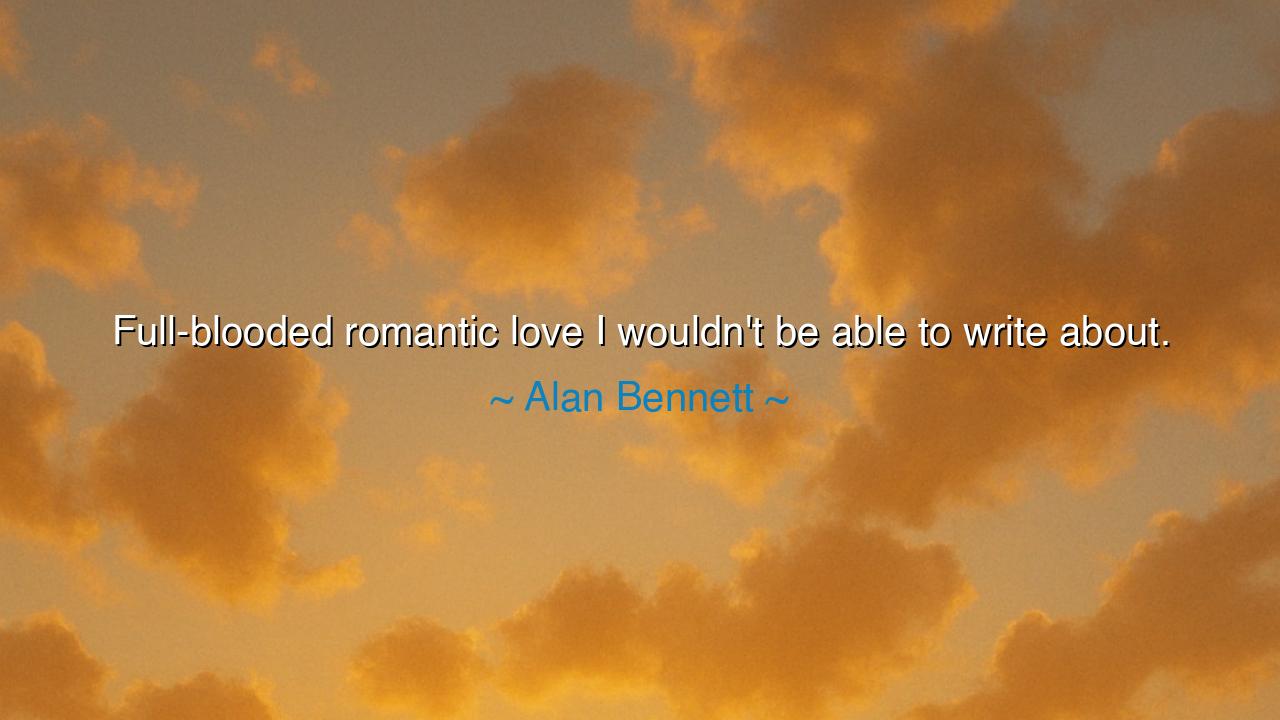
Full-blooded romantic love I wouldn't be able to write about.






“Full-blooded romantic love I wouldn’t be able to write about.” So speaks Alan Bennett, with a voice both humble and honest. In his words, we find the confession of the artist confronted by the enormity of romantic love, that force so vast, so consuming, that even the pen falters before it. To admit one cannot write of it is not weakness, but reverence: an acknowledgment that some experiences are so full-blooded, so overwhelming, that language itself strains and breaks beneath their weight.
For what is romantic love if not the most exalted and terrifying of human passions? It lifts the soul beyond reason, floods the senses, and turns even the wisest into dreamers. To capture it with mere words is like trying to net the sea or bottle the wind. Many poets have tried—Petrarch, Byron, Rumi—and though they left us treasures, still their works are but reflections, shadows of the flame itself. Bennett’s confession, then, is an echo of the ancient recognition: that love, when lived in its fullness, exceeds the capacity of art to contain.
The ancients themselves felt this awe. In the Symposium, Plato’s speakers struggled to define love—some called it a god, others a disease, still others a ladder to the eternal. But none could master it entirely. Even Socrates, whose tongue conquered arguments and men alike, admitted that love was divine madness, impossible to reduce to logic. Bennett stands in this tradition: acknowledging that romantic passion is not so much written about as lived, not so much described as endured.
History gives us examples of both triumph and failure in this endeavor. Consider Shakespeare, who gave us Romeo and Juliet, Antony and Cleopatra, stories drenched in passion. His words seem to capture the thunder of love, yet even he ends in tragedy, showing that love in its full-blooded form resists happy containment. On the other hand, Emily Dickinson, who rarely spoke of love directly, captured its essence in small, piercing lines of longing and absence. Sometimes silence, sometimes restraint, speaks more powerfully of passion than overflowing speech.
Bennett’s admission also reveals the humility of the true artist. He does not claim mastery over all subjects, but recognizes the limits of his own voice. To say “I cannot write about romantic love” is not to dismiss it, but to honor its mystery, to admit that there are realms where the pen bows to the heart. In this, there is wisdom: for not all truths must be spoken; some are to be lived, cherished, and left beyond words.
The lesson for us is this: do not demand that everything sacred be reduced to explanation. Some mysteries are preserved by silence. If you find yourself unable to express the depth of your love, do not despair. Your gestures, your presence, your devotion may speak more eloquently than any poem. And if you are an artist, do not be ashamed of what lies beyond your reach. For even in acknowledging the limits of language, you testify to the greatness of what you cannot name.
Therefore, beloved listener, carry Bennett’s wisdom as both caution and comfort. Know that romantic love, when it arrives, may defy your words, and that is no failure. It is a sign of its power. Do not always strive to capture it with pen or speech; sometimes the truest expression is to live it with all your being. For love in its fullness is not a story to be written, but a life to be lived—and in living it, you write upon the heart of another a script that endures beyond paper, beyond time.






AAdministratorAdministrator
Welcome, honored guests. Please leave a comment, we will respond soon